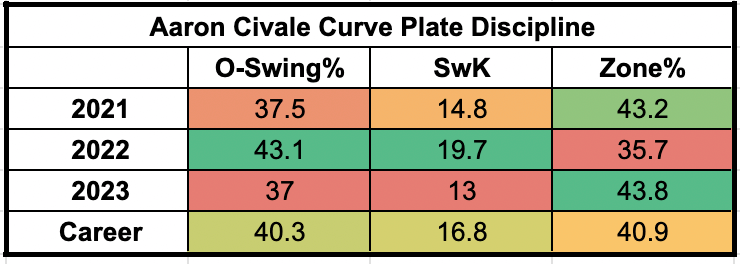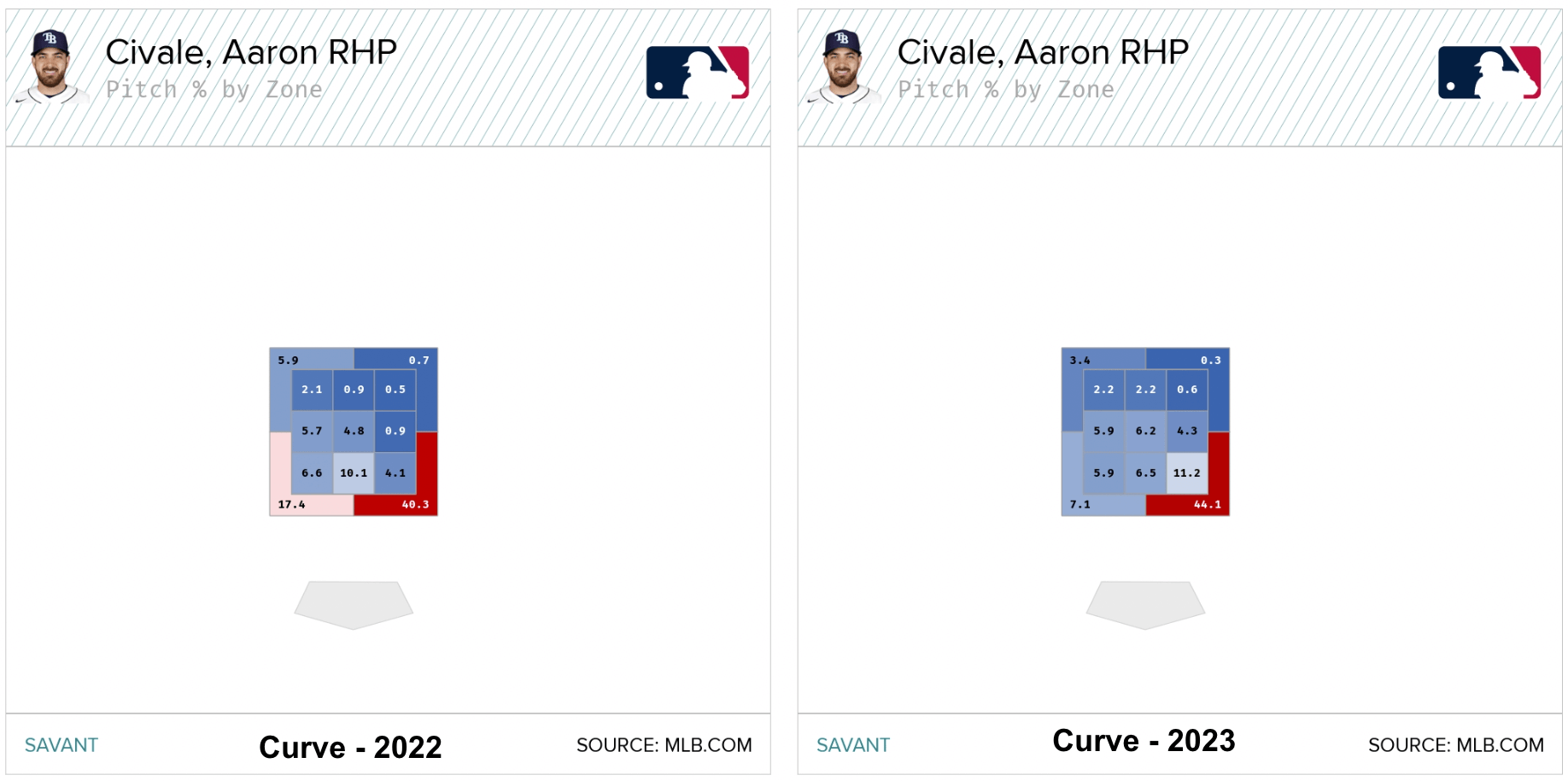
Civale's New Home and New Tweaks
Civale is slicing the cutter usage
Aaron Civale had been slicing the cutter usage from 48.6% in April to 34-39% in June through August with the Guardians. It's still thrown about three points higher than the usage from 2022. The cutter has improved from last season, evidenced by the .265 wOBA (2023) from a .353 wOBA (2022). Part of it slightly involves the luck factors, with a 28% h% (2023) dropping to 26% (2022).
The results improved against both sides of the plate, mainly versus lefties. Civale maintained the cutter usage against lefties, and the actual results improved, with the expected stats raising concern.
- Cutter vs. LHH (2023): .265 wOBA and .351 xwOBA
- Cutter vs. LHH (2022): .336 wOBA and .336 xwOBA
Cutter movement profile change
Civale is throwing the cutter over one mph harder in 2023. And the movement profile shifted quite a bit. His cutter lost four inches of drop, seen below, and two inches of sweep. While that's typical of a pitch with more velocity, one would guess that might happen with a bigger gap in mph.
.jpeg)
Since the cutter lost vertical movement, it translated into about a one-point dip in SwK for the cutter at 9.8% in 2023. It's typically not a primary swing-and-miss offering, so it seems like more of a fastball variation to pair with the sinker since the four-seamer hasn't fared well at times.
He pitches to contact, but kept the home runs in check for 2023, with a 3% hr/f, a third of his career average. As a command and control type pitcher, Civale throws the cutter in the zone 52.9% of the time. It's typically the second-highest zone rate behind the sinker at 60.8%. The cutter has limited the damage compared to past seasons, but the expected metrics look nearly similar. His cutter has a .334 xwOBA (2023) versus a .328 wOBA (2022). That seems to align with the better home run rates.
Trading the sinker for the cutter against RHH
Against right-handed hitters, Civale throws the cutter 30.1% of the time after the sinker led his arsenal in 2022 at 33.5%. He dropped the sinker about nine points at 24.4% to righties as his third-most used pitch behind the cutter and curveball. The sinker performs better versus right-handed hitters, evidenced by a .309 wOBA and a .438 wOBA against lefties.
Interestingly, Civale's sinker doesn't generate as many groundballs as one would imagine, with a 44.6% GB% in his career versus a 31.1% GB% in 2023. He throws the sinker most often in the zone (60.8%) and pitches to contact (86.7%). The sinker's movement profile shifted slightly from 2022 but was not much different from 2021.
.png)
Civale's sinker generated the same level of strikes in 2023. The sinker strike rate bumped up to 68.3% (2023) from 64.6% (2022) and a career Strike% of 65.4%. Though the sinker doesn't typically generate swings and misses, the 6.6% SwK doubled the career average. The main reason for the added sinker whiffs is the ct% falling nearly six points from the career norm.
Where did the whiffs go?
Civale's strikeout rate fell a few points, with the SwK down by one. It's not positive to have the walk rate slightly increase paired with a decline in strikeouts. Civale hardly flashed above-average strikeout skills, and he typically had 1-2 pitches generating a double-digit SwK.

The curveball fell the most, with a three-point drop in SwK from the career SwK. However, the 2022 SwK seems like an outlier, so maybe the 2023 metrics will bounce back. The movement profile on the curve explains the dip in whiffs.
His curveball lost around three inches of vertical drop after adding two mph versus 2022. Again, the 2022 movement and whiffs look like the outlier season because the 2023 profile aligns with the 2021 and past seasons. The curveball still possesses an above-average movement profile, but opposing hitters have a better chance to make contact when it drops slightly less, as seen below.
- Curve ct% 2021: 66.4%
- Curve ct% 2022: 58%
- Curve ct% 2023: 73.6%
- Curve ct% career: 64.8%
The curveball allowing more contact aligns with the decline in swings and misses. Civale's curveball typically induces weaker contact quality, evidenced by the rolling graph of the xwOBA by pitch seen below. And again, the 2022 season shows outlier numbers.
.jpeg)
The heat maps on the curveball show us a similar trend with fewer whiffs and fewer inches of drop.

The visual above shows the pitch percentage by zone on the curveball over the past two seasons. Though Civale continues to throw the curve in Zone 14, which is down and away from right-handed hitters, he threw it more in Zone 13 (down away to lefties) last season. It's something to monitor as he transitions to the Rays.
Final Takeaways
The Rays needed starting pitchers after losing several top options. Though Civale's first start with the Rays didn't go so well, there's a chance the team helps him improve on the movement profiles to the curveball and cutter. Unfortunately, the expected ERA doesn't seem favorable with the luck factors in his favor.
Civale's 4.44 xERA nearly two runs higher than his actual seems due to the high S% (79%) and low hr/f (5%). Those numbers sat seven points above his career average, so expect some ratio regression. That paired with the dip in skills make it a concerning profile, though the Rays have helped underperforming pitchers blossom before.








